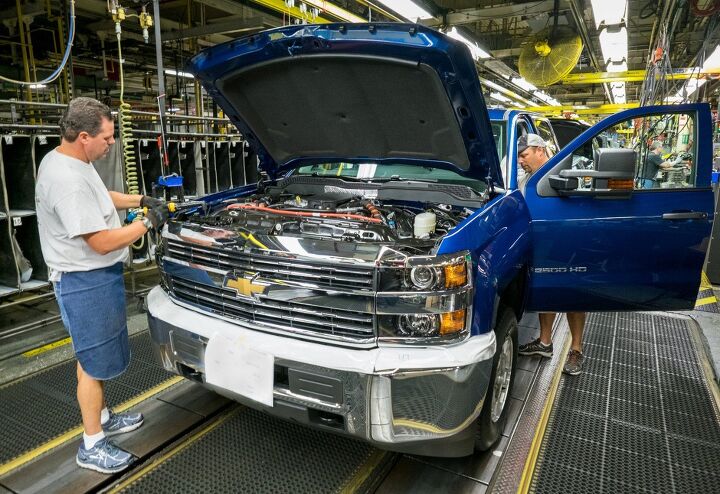Automakers Didn't Even Waste a Full Business Day Asking New EPA Head for Relief

Scott Pruitt, Oklahoma’s former attorney general, was sworn in to his new role as Environmental Protection Agency administrator late Friday following a 52-46 Senate vote earlier in the day.
While it isn’t known what Pruitt did over the weekend, it’s safe to say that members of the Alliance of Automobile Manufacturers spent at least part of that downtime drafting a letter, likely mirroring one they’ve already sent to President Donald Trump.
The group, representing 12 automakers that build 77 percent of the light-duty vehicles sold in the U.S., wants action on lowering the industry’s fuel economy and emissions targets. Urgent action, ideally. Now that there’s been a change at the top, the group feels that it might finally get its wish.
Officially, the alliance wants the EPA to reopen a midterm review of federal corporate average fuel economy (CAFE) standards — a process that was ended a year early when the EPA decided, with days remaining before Trump’s inauguration, to keep the Obama administration’s 2025 targets. The National Highway Traffic Safety Administration hasn’t yet issued its recommendation.
According to Automotive News, the alliance waited out the weekend and President’s Day before delivering a letter to Pruitt yesterday.
In it, the group blasted the EPA’s past decision to end the review, calling it “the product of egregious procedural and substantive defects.” The decision was “riddled with indefensible assumptions, inadequate analysis and a failure to engage with contrary evidence,” the alliance added.
The EPA is reportedly reviewing the letter. While the agency expects to receive a number of executive orders from the president, there has been no word on what action, if any, could be taken to relax auto industry regulations. Pruitt told the Senate that he would review the Obama-era policies.
In recent months, the alliance, as well as the CEOs of various automakers, have expressed concern about how CAFE targets could impact their business and the cost of vehicles. The midterm review found that automakers had made decent headway towards the 2025 goal. Still, the alliance has stood firm, stating recently that 1 million jobs are threatened by the regulations.
After Pruitt’s confirmation as EPA head, the alliance issued a release stating:
The Administrator has a keen understanding of how compliance with the government fuel economy/greenhouse gas program depends on what consumers buy, not what automakers produce. That’s why standards must also reflect market realities.
We remain convinced the best way to advance our shared goals for the environment, safety, consumer affordability and manufacturing jobs is to reinstate the data-driven review — under the originally promised schedule.
[Image: General Motors]

More by Steph Willems
Latest Car Reviews
Read moreLatest Product Reviews
Read moreRecent Comments
- ToolGuy™ I respect what the seller is doing, but this vehicle is not for me. (Seller doesn't care, has two people lined up already.)
- SCE to AUX How well does the rear camera work in the rain and snow?
- MaintenanceCosts The Truth About Isuzu Troopers!
- Jalop1991 MC's silence in this thread is absolutely deafening.
- MaintenanceCosts Spent some time last summer with a slightly older Expedition Max with about 100k miles on the clock, borrowed from a friend for a Colorado mountain trip.It worked pretty well on the trip we used it for. The EcoBoost in this fairly high state of tune has a freight train feeling and just keeps pulling even way up at 12k ft. There is unending space inside; at one point we had six adults, two children, and several people's worth of luggage inside, with room left over. It was comfortable to ride in and well-equipped.But it is huge. My wife refused to drive it because she couldn't get comfortable with the size. I used to be a professional bus driver and it reminded me quite a bit of driving a bus. It was longer than quite a few parking spots. Fortunately, the trip didn't involve anything more urban than Denver suburbs, so the size didn't cause any real problems, but it reminded me that I don't really want such a behemoth as a daily driver.


































Comments
Join the conversation
"1 million jobs are threatened" I can't imagine the shock of the AAM when after years of rigorous analysis, test cases, and market simulations the report spit out that exactly 1,000,000.00 jobs would be "threatened". They must have been really worried that people might think they just pulled a big scary number out of their ass. Anyway, kudos to the brave new administration's unlimited distribution of easy buttons. Its obvious 'merica can't do anything that sounds hard anymore.
Just as an example of what CAFE has done. Most recent BMWs have an electric water pump to take the mechanical pump load off the engine to tweak out a few extra tenths of an MPG in the CAFE tests. These pumps cost between $600 to $1000 installed and are not a DIY job, and it is common to need a replacement at about 60,000 miles. I remember changing the mechanical water pump on my BMW 2002 at about 100,000 miles, easy DIY job and the pump was less the $50. Without CAFE, BMW would never make such a change, because the gas savings from the electric pump will never be high enough to pay for the higher pump cost.